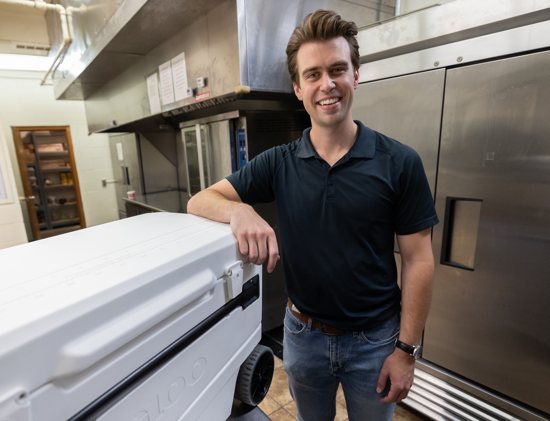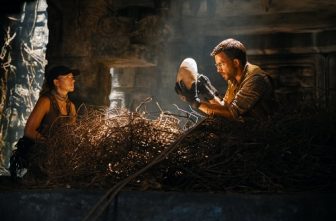
Entrepreneurs often solve problems close to home. When Will Pittner was asked to pitch a business idea for a school assignment during his senior year at the University of St. Thomas in St. Paul, he noticed leftover food every day on campus and resolved to salvage it. Food to People was born, a program in which unused food is frozen and delivered to area homeless shelters and churches.
Pittner, 25, is a one-man operation, loading coolers of food from five distribution sites into his Chrysler minivan to deliver at six or seven collection sites across the Twin Cities metro. His faith is the fuel, says the Rochester native who now lives in Hopkins and attends Our Lady of Guadalupe in St. Paul.
Local Catholics can support Food to People by coming to one of the organization’s free meals to eat, observe or socialize, including: Sept. 28 from 5-7 p.m. at Ascension in Minneapolis; Oct. 10 from 5:30-6:30 p.m. at All Saints in Lakeville; or Oct. 17 from 5:30-6:30 p.m. at Guardian Angels in Oakdale.
Q) How does your faith compel you to help others?
A) My parents really emphasized the dignity of the human person and how everyone has a story about how they got right there. The least we can do is love … them and take a genuine interest in them. They were really good at emphasizing how that ties into Catholic social teaching.
My mom was our school librarian. She was always volunteering, and she was definitely that outlet for a lot of people, specifically women, to talk to. She has that nurturing, maternal gift: “Whatever you’re going through, you’re going to get through.” She looks at you with love in her eyes and suddenly you feel better.
Q) Your observations as a student worker led you to research the issue.
A) I learned that at least 30 percent of food intended for human consumption gets thrown away and goes to a landfill. That started me on a journey of asking questions of the cooks and kitchen staff and (I came) to find: It’s almost no fault of their own it. It’s almost the nature of the business model –– and also their fear of running out of food.
Q) You solved that problem by freezing the unused food and delivering it to local churches and shelters. What did you learn from founding Food to People?
A) Patience. We all have this great plan in our head, and we want it now. Every six months, light hits me and God opens my eyes, and I laugh. It’s almost like a checkpoint: “Wow, if I would’ve had everything my way, how I wanted it six months ago, everything would’ve fallen flat on its face.” In hindsight, you can see the strings of God pulling you where you need to be.
During my senior year, when I was trying to get Food to People going, I was DoorDash-ing and selling my plasma and doing all sorts of things to pay rent. You get scrappy!
That taught me humility and that God’s love for me is not in direct proportion to the amount of material things I possess. I was at a season in life where I was so gung-ho on the prosperity Gospel. You hear speakers say that if you just believe enough, God will give you something. I learned I should ask first what is God’s will and then go from there.
Q) Any mistakes you’ve corrected?
A) Yes, it’s the scope, in the sense of an openness to all. We’re not calling a specific type of person to the table. Rather, we’re calling all. I learned that the hard way the first time I worked with Guardian Angels and we said, “This is for food-insecure people.” No one came.
We learned to say, “Hey, it doesn’t matter your background. This is for all people because everyone is spiritually hungry.” How can we create an encounter to let people know that they are seen, known and loved? This food is a tool to create that.
Q) Is there something about being a Christian that dovetails with being an entrepreneur?
A) It requires a childlike faith to step out on a limb. And I think the greatest entrepreneurs are servants of many. That’s Christ’s mode of operating. He didn’t come to be served but to serve.
Q) Now that you’ve successfully launched a business, are you less afraid to go out on a limb?
A) Totally. I’m bolder. It helps you trust in God more.
Q) What advice would you give someone who has a big dream or project in mind?
A) At some point, you have to go out on faith and do it. We’re in a culture that confuses discernment with action. You get the same dopamine release from telling people you’re going to write a book than you do from actually writing the book. It’s so easy to talk the talk.
Bill Lentsch, the COO of the archdiocese, who’s been a great mentor, suggested a book by Eliyahu Goldratt called “The Goal.” It’s really helped shape my thinking on how to work effectively.
Q) How do you pass the time when you’re driving around delivering food?
A) I’m an ardent rosary prayer. I pray one rosary a day. And I love St. Francis’ prayer for peace. I listen to podcasts from Bishop (Robert) Barron and the Word on Fire Institute and from Jimmy Akin from Catholic Answers, called “Jimmy’s Mysterious World.” He talks about all different things under the sun. “Does the Bible talk about whether aliens exist?”
When the going gets tough, songs that have to do with cars and highways are a go-to, like “Life Is a Highway” (by Tom Cochrane), “On the Road Again” by Willie Nelson, “American Ride” by Toby Keith. I make a game out of how many songs I can play that relate to one another.
Q) Humor is necessary for the road?
A) You can’t take yourself too seriously. As an entrepreneur, you’re going to fail way more times than you’re going to succeed. God knows we’re going to fail. That’s why we have confession. I can’t live my life hoping to not fail.
Q) You’re busy! How do you get it all done?
A) I try to be disciplined. Thankfully I’ve never been a big social media guy. My vice is YouTube because I can justify the next video: “Oh, I’m learning something, it’s productive.”
I did Exodus 90 with five other friends of mine starting Jan. 1. That really helped me rid myself of negative habits and helped me realize how much time I actually have in my day.
Q) What did you cut — besides YouTube?
A) You have to take cold showers in Exodus 90 so you want to be as fast as possible. There’s no unnecessary spending during Exodus 90, so you realize how often you can justify: “I have to run to Target real quick because I have to get something.” And then you go, “Well, I don’t actually need that.”
Q) What does it feel like to be a lifelong learner?
A) You continue to learn how much you don’t know. It keeps you humble and hopeful. “Wow! There is somebody who’s dedicated their entire life to learning this one thing and I didn’t even know it existed.”
I read Matthew McConaughy’s book “Green Lights,” which was based on these writings of his when he was younger. I thought: “How cool was it that he could go back and read what was going through his mind when he was 25 and in the thick of it, trying to figure out who he is and make it big? I want to do that!”
So, I’ve started writing in a bunch of old composite spiral notebooks. I’m writing to my grandkids. When I’m 75 and I have a grandkid who asks what I was thinking about when I was 25, I can show him these writings that I’m writing for 50 years from now.
Q) What do you know for sure?
A) If there’s anything I know, it’s: I know nothing. Every time I think I know something; it gets ripped out from under me.
Who you surround yourself with is important. You have your values, but you have to be malleable enough to go with whatever comes your way and respond to God. Have your lists of non-negotiable values and then be malleable enough to respond to the call that God gives you.




